|
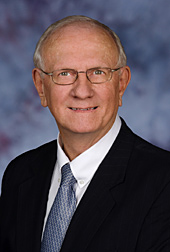 WASHINGTON, February 12, 2008 —Soil scientist Norman R. Fausey has been named "Distinguished Senior Research Scientist of 2007" by the Agricultural Research Service, the chief scientific research agency of the U.S. Department of Agriculture. Fausey heads the ARS Soil Drainage Unit in Columbus, Ohio. WASHINGTON, February 12, 2008 —Soil scientist Norman R. Fausey has been named "Distinguished Senior Research Scientist of 2007" by the Agricultural Research Service, the chief scientific research agency of the U.S. Department of Agriculture. Fausey heads the ARS Soil Drainage Unit in Columbus, Ohio.
Fausey is being recognized for his significant accomplishments in promoting efficiency and environmental stewardship in managing agricultural drainage water—work that has benefitted farmers, the drainage industry and the general public. Fausey and other ARS researchers were honored today at an awards ceremony here.
"Over the past 47 years, Dr. Fausey has played an important role in revolutionizing drainage technology," said ARS Administrator Edward B. Knipling. "His research has helped protect valuable water resources while helping farmers better manage their precious water supplies."
Fausey led the development of a new generation of agricultural drainage water management technology, using valves to maintain or raise, as well as lower, the drainage outlet to control the water table. Such controlled drainage reduces the flow of nitrates from Midwestern fields to the Gulf of Mexico by 40 percent, reducing the likelihood and extent of seasonal dead zones in the Gulf.
|
|
 ARS also honored seven "Area Senior Research Scientists" today: ARS also honored seven "Area Senior Research Scientists" today:
Richard Beeman, ARS Grain Marketing and Production Research Center, Manhattan, Kan., for pioneering research in insect genomics leading to the discovery of a class of "suicide" genes that could be spread into populations of undesirable insects such as the malaria mosquito or grain pests. He also was recognized for leadership resulting in the first complete genome sequence of an agricultural pest. (More)
|
|
 Albert J. Clemmens, ARS Water Management and Conservation Research Unit, Maricopa, Ariz., for leadership and scientific contributions that have advanced the performance of irrigated agriculture, both within the United States and worldwide. Albert J. Clemmens, ARS Water Management and Conservation Research Unit, Maricopa, Ariz., for leadership and scientific contributions that have advanced the performance of irrigated agriculture, both within the United States and worldwide.
|
|
 Paula J. Fedorka Cray, ARS Bacterial Epidemiology and Antimicrobial Resistance Research Unit, Athens, Ga., for outstanding leadership and contributions related to food safety research, particularly Salmonella control, and for reducing the risks of livestock and people developing resistance to antibiotics and other antimicrobial drugs. (More ) Paula J. Fedorka Cray, ARS Bacterial Epidemiology and Antimicrobial Resistance Research Unit, Athens, Ga., for outstanding leadership and contributions related to food safety research, particularly Salmonella control, and for reducing the risks of livestock and people developing resistance to antibiotics and other antimicrobial drugs. (More )
|
|
 James A. Joseph, Jean Mayer USDA Human Nutrition Research Center on Aging at Tufts University, Boston, Mass., for work showing that blueberries could help prevent age-related deficits in memory and motor function, and may be of some benefit in preventing neurodegenerative diseases such as Alzheimer's disease. (More ) James A. Joseph, Jean Mayer USDA Human Nutrition Research Center on Aging at Tufts University, Boston, Mass., for work showing that blueberries could help prevent age-related deficits in memory and motor function, and may be of some benefit in preventing neurodegenerative diseases such as Alzheimer's disease. (More )
|
|
 Russell J. Kohel, ARS Crop Germplasm Research Unit, College Station, Texas, for exemplary research and leadership in cotton genetics and in the collection, preservation, enhancement and use of cotton germplasm for improvement of the crop worldwide. Russell J. Kohel, ARS Crop Germplasm Research Unit, College Station, Texas, for exemplary research and leadership in cotton genetics and in the collection, preservation, enhancement and use of cotton germplasm for improvement of the crop worldwide.
|
|
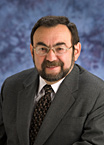 Yakov A. Pachepsky, ARS Environmental Microbial Safety Laboratory, Beltsville, Md., for research and international leadership in development and application of models in agricultural hydrology to predict crop yields, assess soil and water quality, and forecast fate and transport of manure-borne pathogens. Yakov A. Pachepsky, ARS Environmental Microbial Safety Laboratory, Beltsville, Md., for research and international leadership in development and application of models in agricultural hydrology to predict crop yields, assess soil and water quality, and forecast fate and transport of manure-borne pathogens.
|
|
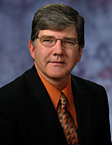 Randy L. Raper, ARS National Soil Dynamics Laboratory, Auburn, Ala., for outstanding research and leadership that have increased understanding of soil/plant/machine processes, particularly their effects on soil compaction, and have increased adoption of conservation tillage. (More) Randy L. Raper, ARS National Soil Dynamics Laboratory, Auburn, Ala., for outstanding research and leadership that have increased understanding of soil/plant/machine processes, particularly their effects on soil compaction, and have increased adoption of conservation tillage. (More)
|
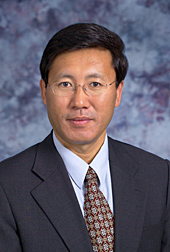
ARS also recognized exceptional "early career" scientists who have been with the agency for seven years or less. The top prize, called the Herbert L. Rothbart Outstanding Early Career Research Scientist Award, went to Zhongli Pan of the ARS Processed Foods Research Unit in Albany, Calif.
Pan was honored for developing numerous energy-efficient processing methods that improve the value and healthfulness of a variety of commodities. These include developing new infrared heating technologies as alternatives to freeze-drying fruits and vegetables, as well as a nonchemical way to disinfest rice and pasteurize almonds.
|
|
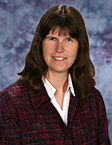 The seven "Area Early Career Research Scientist Award" winners for 2007 are: The seven "Area Early Career Research Scientist Award" winners for 2007 are:
Kristin D. Bilyeu, ARS Plant Genetics Research Unit, Columbia, Mo., for developing germplasm and genetic markers to help breeders develop soybeans whose oil does not need hydrogenation and is free of trans fatty acids.
|
|
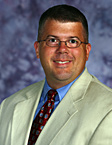 Todd R. Callaway, ARS Food and Feed Safety Research Unit, College Station, Texas, for the first successful demonstration of using naturally occurring viruses to control E. coli O157:H7 in livestock. Todd R. Callaway, ARS Food and Feed Safety Research Unit, College Station, Texas, for the first successful demonstration of using naturally occurring viruses to control E. coli O157:H7 in livestock.
|
|
 Wade Crow, ARS Hydrology and Remote Sensing Laboratory, Beltsville, Md., for enhancing the value of remote sensing observations for farm applications that include water quality monitoring, crop yield forecasting, irrigation scheduling, and predicting droughts and floods. Wade Crow, ARS Hydrology and Remote Sensing Laboratory, Beltsville, Md., for enhancing the value of remote sensing observations for farm applications that include water quality monitoring, crop yield forecasting, irrigation scheduling, and predicting droughts and floods.
|
|
 William A. Dozier III, ARS Poultry Research Unit, Mississippi State, Miss., for improving production efficiency of broiler chickens through better nutrition and increased ventilation in summer heat, and for having a major impact on guidelines for the humane treatment of chickens. William A. Dozier III, ARS Poultry Research Unit, Mississippi State, Miss., for improving production efficiency of broiler chickens through better nutrition and increased ventilation in summer heat, and for having a major impact on guidelines for the humane treatment of chickens.
|
|
 Darrell R. Kapczynski, Southeast Poultry Research Laboratory, Athens, Ga., for the development of improved vaccines and other control measures to protect poultry against avian viral diseases, including avian flu. Darrell R. Kapczynski, Southeast Poultry Research Laboratory, Athens, Ga., for the development of improved vaccines and other control measures to protect poultry against avian viral diseases, including avian flu.
|
|
 Tracy C. Leskey, ARS Appalachian Fruit Research Station, Kearneysville, W.Va., for development of bait traps for monitoring insects such as the plum curculio, which attacks plum, apple and other fruit trees. Leskey also was recognized for developing lures and other compounds that disrupt the mating of dogwood borers, which attack apple trees as well as dogwoods. Tracy C. Leskey, ARS Appalachian Fruit Research Station, Kearneysville, W.Va., for development of bait traps for monitoring insects such as the plum curculio, which attacks plum, apple and other fruit trees. Leskey also was recognized for developing lures and other compounds that disrupt the mating of dogwood borers, which attack apple trees as well as dogwoods.
|
|
 Mark Liebig, ARS Northern Great Plains Research Laboratory, Mandan, N.D., for improved understanding of the impact of farming and ranching practices on soil and on emissions of greenhouse gases. Liebig also was recognized for contributing to the development of a carbon credit program for North Dakota and for quantifying organic farming's beneficial effects on soil quality. Mark Liebig, ARS Northern Great Plains Research Laboratory, Mandan, N.D., for improved understanding of the impact of farming and ranching practices on soil and on emissions of greenhouse gases. Liebig also was recognized for contributing to the development of a carbon credit program for North Dakota and for quantifying organic farming's beneficial effects on soil quality.
|


 WASHINGTON, February 12, 2008 —Soil scientist
WASHINGTON, February 12, 2008 —Soil scientist  ARS also honored seven "Area Senior Research Scientists" today:
ARS also honored seven "Area Senior Research Scientists" today:


 Russell J. Kohel,
Russell J. Kohel, 

 The seven "Area Early Career Research Scientist Award" winners for 2007 are:
The seven "Area Early Career Research Scientist Award" winners for 2007 are:




